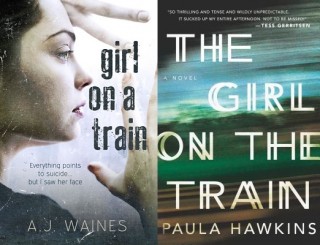November 17, 2015
Readers who thought they were buying The Girl on the Train make Girl on a Train a surprise hit
by Mark Krotov
The virtues of physical bookstores are well-known: they encourage chance encounters and spontaneity, they support local communities, they are not terrible mega-corporations. One more point in their favor: it’s hard to buy the wrong book when you’re actually holding it in your hands.
As it turns out, shopping online can lead to confusion, and it can even keep readers from the girl-and-train-themed novels they crave. Yesterday, the Wall Street Journal’s David Benoit reported on the unlikely success of a two-year-old psychological thriller by A.J. Waines called Girl on a Train. This sudden success seems driven, in large part, by people who have confused the book for Paula Hawkins’s massive hit The Girl on the Train.
Of roughly 300 reviews on Amazon of Ms. Waines’s 2013 book since Ms. Hawkins published her novel in January, around 40 reference buying the wrong book. Many appear to have read the entire 429-page novel without realizing their error.
Benoit reports that Waines’s book has topped Amazon’s e-book bestseller lists in the UK and Australia, and that Girl on a Train has even been selected by a number of book clubs—including one based in Needham, MA, one of whose members happens to be Benoit’s own mother.
Waines herself, however, isn’t mystified by her newfound fame: “I was under no illusions that somehow my book had been found miraculously,” she told Benoit.
Naturally, copycats pop up whenever a book attains a certain level of fame (the self-published The Vampire With the Dragon Tattoo is just one modest—and weird—example), but Waines isn’t a cynical author trying to cash in. Rather, her book mostly owes its second life to Kindle and metadata-induced confusion.
So the lesson is clear: if you want to avoid buying the wrong book for your book club and having your son reveal your error in the pages of the Wall Street Journal, shop at a physical bookstore.
Mark Krotov is senior editor at Melville House.
